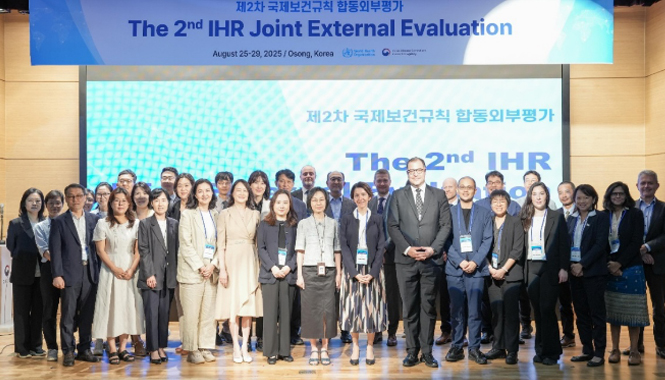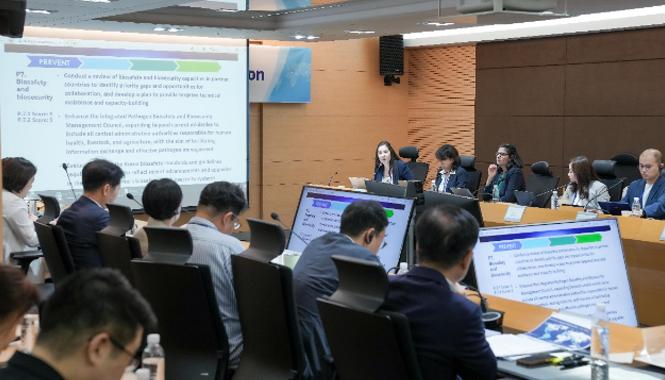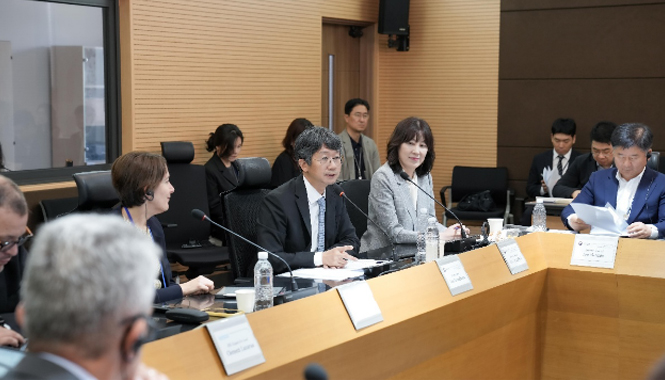
GHSCO Newsletter
September 2025
Volume2 Number3
News1
The Republic of Korea Demonstrates Strong Health Security Capacity Through WHO Joint External Evaluation (JEE)
Korea Completes Second JEE, Strengthening Global Health Security Standing
Korea has successfully completed its second Joint External Evaluation (JEE), led by the World Health Organization (WHO). The evaluation team consisted of 14 experts from WHO, France, Australia, Finland, Argentina, Singapore, China, and Japan, reflecting broad international expertise. The evaluation reaffirmed Korea’s robust preparedness and response capacity against all-hazard public health emergencies.
Conducted at the Korea Disease Control and Prevention Agency (KDCA) headquarters in Osong from August 25th to 29th, the evaluation assessed Korea’s ability to prevent, detect, and respond to health emergencies ranging from infectious disease outbreaks to food safety incidents, chemical accidents, and radiation emergencies.
 Opening Ceremony
Opening Ceremony
Significant Progress Since 2017
This was Korea’s second JEE, following the first in 2017. Since then, Korea has demonstrated improvements across all 19 technical areas, achieving an impressive 93% of indicators at the highest “sustainable capacity” level (a score of 5 out of 5), with the remaining indicators scoring 4.
Notably, the evaluation team highlighted Korea’s strengthened legal frameworks, financing mechanisms, emergency response operations, and inter-ministerial coordination, particularly built during the COVID-19 pandemic. The KDCA’s Emergency Operations Center (EOC), laboratory systems, and predictive modeling capacity were highlighted as best practices.
Dr. Gina Samaan,
WHO WPRO Emergency Director
He emphasized Korea’s excellence in both technical capacity and institutional cooperation, calling the country “a global model in biosafety, antimicrobial resistance, and food safety.”
Dr. Clément Lazarus,
Joint Team Lead
 Reporting the score of P7. Biosafety and Biosecurity
Reporting the score of P7. Biosafety and Biosecurity
Recommendations for the Future
While Korea’s system was rated highly across all areas, there are also recommended areas for further development:
- Establishing dedicated, long term funding mechanism for global health security and pandemic preparedness and response, including vaccine and therapeutic stockpiles.
- Addressing the needs of vulnerable populations into health security planning, considering emerging societal changes, including climate change impacts (e.g., heatwaves) and population aging.
- Designating of a National IHR Authority to coordinate policies across the entire government and relevant social sectors, supporting smooth implementation of the amended International Health Regulations (IHR).
- Developing and implementing a multisectoral national action plan for health security.
- Expanding community engagement networks with civil society, media, and local organizations to enhance risk communication.
- Strengthening IHR core capacities at the regional and global levels by leveraging Korea’s robust health security system and expertise.
 Closing Remarks from the KDCA Commissioner
Closing Remarks from the KDCA Commissioner
WHO WPRO and JEE
The International Health Regulations (IHR) (2005) are a legally binding international agreement designed to help prevent the spread of disease. They set out the core capacities that countries must have to detect, report, and rapidly respond to public health threats—whether arising naturally, deliberately, or accidentally.
To assess these national capacities and support effective IHR implementation, the IHR Monitoring and Evaluation Framework (IHR MEF) was developed by the World Health Organization (WHO) through a global consultative process. The framework comprises four components: State Party Annual Reports (SPAR), Joint External Evaluations (JEE), After Action Reviews (AAR), and Simulation Exercises (SimEx). Of these, SPAR is mandatory under Article 54 of the IHR (2005), requiring annual reporting to WHO by State Parties. The other three tools are voluntary.
The JEE process, developed by WHO in collaboration with partners such as the Global Health Security Agenda (GHSA), has undergone multiple revisions since its launch in 2016. These updates reflect recommendations from experts, Member States, and international reviews—including the IHR Review Committee, which urged a shift from “exclusive self-assessments” to a combined approach of self-evaluation, peer review, and external assessments by both domestic and independent experts. The tool is now in its third iteration.
JEE is a voluntary, collaborative, and multisectoral process for assessing a country’s capacity to prevent, detect, and rapidly respond to public health emergencies. National and international experts jointly review 19 technical areas, providing countries with a comprehensive view of their health security systems—including strengths and challenges—so that priority actions can be identified and gaps addressed.
Since 2016, 28 JEE missions have been conducted across 21 countries in the Western Pacific Region. The JEE has proven to be a valuable platform for strengthening multisectoral collaboration at the country level and advancing the implementation of the IHR (2005). It also fosters stronger partnerships between countries, technical partners, and WHO. Findings from JEE missions have helped countries successfully mobilize resources to finance their National Action Plans for Health Security (NAPHS).
She commended Korea’s “remarkably strengthened crisis response system and training framework compared to 2017,” noting its forward-looking vision and investments.